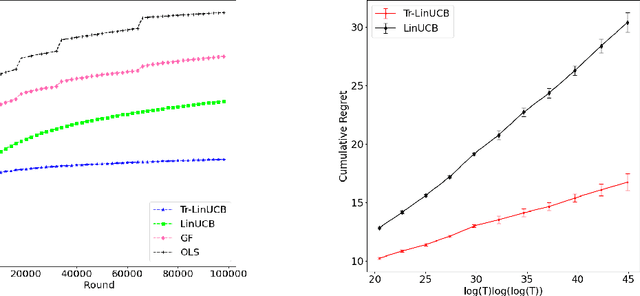Truncated LinUCB for Stochastic Linear Bandits
Paper and Code
Feb 23, 2022



This paper considers contextual bandits with a finite number of arms, where the contexts are independent and identically distributed $d$-dimensional random vectors, and the expected rewards are linear in both the arm parameters and contexts. The LinUCB algorithm, which is near minimax optimal for related linear bandits, is shown to have a cumulative regret that is suboptimal in both the dimension $d$ and time horizon $T$, due to its over-exploration. A truncated version of LinUCB is proposed and termed "Tr-LinUCB", which follows LinUCB up to a truncation time $S$ and performs pure exploitation afterwards. The Tr-LinUCB algorithm is shown to achieve $O(d\log(T))$ regret if $S = Cd\log(T)$ for a sufficiently large constant $C$, and a matching lower bound is established, which shows the rate optimality of Tr-LinUCB in both $d$ and $T$ under a low dimensional regime. Further, if $S = d\log^{\kappa}(T)$ for some $\kappa>1$, the loss compared to the optimal is a multiplicative $\log\log(T)$ factor, which does not depend on $d$. This insensitivity to overshooting in choosing the truncation time of Tr-LinUCB is of practical importance.
 Add to Chrome
Add to Chrome Add to Firefox
Add to Firefox Add to Edge
Add to Edge